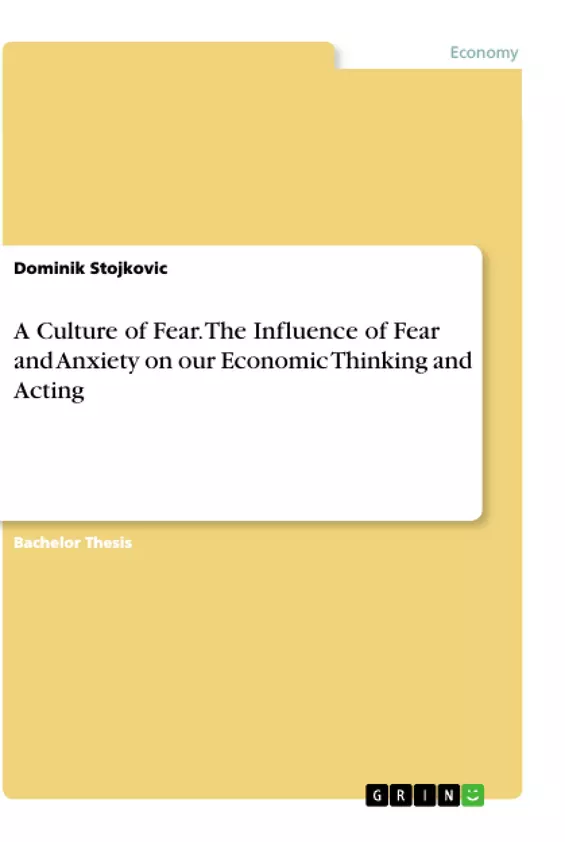Nietzsche complains that the world has lost much of its charm because we no longer fear it enough. This diagnosis hardly seems to apply to our age. The emergence of a culture of fear can scarcely be said to have made the world more charming, either.
Fear is dark and heavy. It laces one’s throat, takes our breath away, freezes us. Fear is a feeling everyone knows and nobody wants to have. Those who are afraid can no longer think clearly, mainly because they are afraid to lose something: their face, their money, their child, their safety. Whatever our fear may be directed to, whether rational or irrational, diffuse, floating, object-related or chronic: it is, in any case, existential. It shows us what we could lose—and at the same time hinders us from preventing that loss. In uncertain times, individual fears are often raised to a general social mood, an attitude to the life of an entire society. Given the increasing complexity of a world in which everything is interwoven and news is pouring on us in real-time, one might feel that fear is the predominant emotion in our culture.
In this study, Dominik Stojkovic examines the concept of fear and anxiety in order to explain its impact on people living in Western culture. In particular, the effect of fear and anxiety on people's economic thinking and decision-making is analyzed to understand what possible economic loss may come with growing fear and anxiety.
The author finds that the fear instinct of people living in Western cultures can harm them by distorting their worldview and influencing their decision-making process. People, then, seem to allow emotional, instinctive reactions instead of adhering to rational logic.
This work is divided into four main chapters, each of which has several subchapters. In Chapter I, the author examines in-depth research on emotions using the findings of various arts, such as neurobiology, philosophy, and sociology, in order to explain what emotions are in general and what kinds of emotions fear and anxiety are in particular. Chapter II is devoted to the title of this thesis. The author analyzes the role of fear and anxiety in the minds of people living in Western cultures today. The impact of this culture of fear on decision-making is discussed in Chapter III. Finally, in Chapter IV, Dominik Stojkovic shows possible ways to lead us beyond the culture of fear.
Inhaltsverzeichnis (Table of Contents)
- Defining Fear and Anxiety
- Emotions
- From Fear to Anxiety
- The Attraction of Fear
- Fear: Omnipresent and Strong
- The Culture of Fear
- Fear and Risk
- Economics of Fear
- Homo Anxietas
- Fear and Action
- Fear and Performance
- Beyond Fear
Zielsetzung und Themenschwerpunkte (Objectives and Key Themes)
This thesis aims to analyze the concept of fear and anxiety in order to understand its impact on people living in Western culture. The work focuses specifically on how fear and anxiety influence peoples' economic thinking and decision-making, exploring the potential financial and economic consequences of growing fear and anxiety.
- Defining fear and anxiety as distinct emotions
- Analyzing the role of fear and anxiety in Western culture
- Examining the influence of fear and anxiety on economic thinking and decision-making
- Exploring the potential economic consequences of growing fear and anxiety
- Developing a framework for understanding the impact of fear and anxiety on individuals and society.
Zusammenfassung der Kapitel (Chapter Summaries)
- Chapter 1: This chapter provides an in-depth analysis of emotions, focusing on fear and anxiety. Drawing upon research from various fields, including neurobiology, philosophy, and sociology, the chapter explores the nature of emotions and the unique characteristics of fear and anxiety.
- Chapter 2: This chapter delves into the concept of the "Culture of Fear," examining the role fear and anxiety play in the minds of people living in Western cultures. It starts by defining culture and then analyzes historical and current evidence to demonstrate the transition of fear from a physical alarm mechanism to a cultural characteristic of modern society.
Schlüsselwörter (Keywords)
This thesis focuses on the themes of fear, anxiety, Western culture, economic thinking, decision-making, and the potential economic consequences of growing fear and anxiety. It explores the role of emotion in economic behavior and examines how fear can influence individual and societal economic outcomes.
Frequently Asked Questions
What is the "Culture of Fear" in Western society?
It refers to a social mood where individual fears are elevated to a general cultural characteristic, influencing how an entire society perceives risks and safety.
How does fear affect economic decision-making?
Fear can distort a person's worldview, leading to emotional and instinctive reactions instead of rational logic, which often results in financial losses.
What is the difference between fear and anxiety in this study?
The study defines them as distinct emotions, exploring how they transition from a physical alarm mechanism to a complex cultural and psychological state.
What fields of research are used to analyze emotions in this thesis?
The author draws upon neurobiology, philosophy, and sociology to explain the nature and impact of fear and anxiety.
Can we move beyond the culture of fear?
The final chapter of the work explores potential ways and frameworks to lead individuals and society beyond a life dominated by fear.
- Quote paper
- Dominik Stojkovic (Author), 2020, A Culture of Fear. The Influence of Fear and Anxiety on our Economic Thinking and Acting, Munich, GRIN Verlag, https://www.grin.com/document/978863



